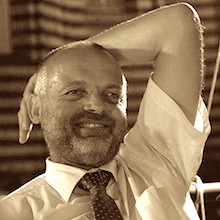When I first wrote this blogpost it was 2017. Revisiting I found it even more current. I did not change anything but added a summary.
When I first watched the video from Martin Dougiamas keynote at Moodle moot 2017 in Germany I was surprised — I did not expect to hear him talk about the most important problems the whole world is facing, I was impressed by his very clear views and statements. As most reviews I read concentrate on the technical aspects of the future of moodle I want to emphasize some of his more basic statements: the motivation and the goals behind. I strongly agree with him and did since I first got to know all the groups working this way like the whole OpenSource/GNU/FSF community (which was established 30 years ago). In fact even writing this blog has the same basic idea.
So what did he talk about? Some key statements:
1. Education as a Key to Global Challenges
Dougiamas links major global issues—such as inequality, climate change, data ownership, automation, and the future of work—to education. He emphasizes that improving education is essential to addressing these problems collectively and sustainably.
“Education is actually connected to all of this.”
2. Critique of the Silicon Valley Model
He criticizes the profit-driven capitalist model, particularly as practiced in Silicon Valley, which is focused on disruption, exponential growth, and monetization. He argues this model is not appropriate for education, as it prioritizes financial gain over public good.
“Profit is the goal, poverty is the game. […] That’s not a good way of thinking about things.”
3. Moodle as Part of the “Open Movement”
Dougiamas identifies Moodle as part of the broader open movement, which includes open-source software, open government, open standards, and open educational resources (OER). He acknowledges that Moodle hasn’t collaborated enough with other open initiatives in the past—but says this must change.
“We are part of that. Moodle has not worked very closely with these in the past, but it’s time for that to change.”
4. Openness as a Core Value
Openness is a foundational value at Moodle. Dougiamas defines it broadly—not just in terms of open-source code, but also openness to users, accessibility, inclusivity, and cultural respect.
“We try to be open in how we do our project, open with our communities, open to all types of users.”
5. New Community Platform with Integrated OER
He presents a vision for a future Moodle platform where educators can search, share, reuse, and even monetize OER directly within their course interface. This includes features like ratings, professional networking, and crowdfunding for plugin development.
“To create this kind of space where people can share things freely but also make a living. Software should be free, but people should never be free.”
“We can integrate all the open resources. […] You can drag and drop stuff into your course.”
Conclusion
Martin Dougiamas positions open software and open educational resources not just as tools, but as ethical and structural alternatives to commercialized education. He envisions Moodle as a global, sustainable ecosystem—a place where openness, collaboration, and educational equity converge to support educators and learners worldwide.
(Summary provided by ChatGPT; revised; emphasised by the author)
